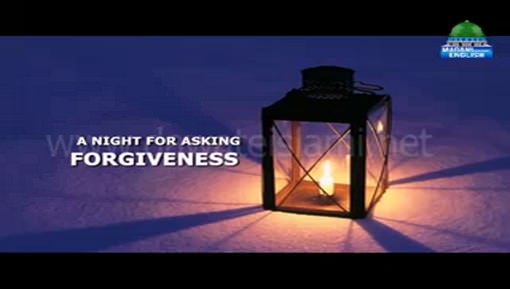
The Creed of Islam
Night Vigil
Maulana Muhammad Adnan Chishti Attari Madani
Every believer is aware that the primary goal of our existence to worship and recognise Allah Almighty. Despite this worthy goal underpinning our lives, Allah Almighty has not bound us to worship Him in each moment – this is His grace and kindness. Instead, He has prescribed a balanced approach for human beings whereby we are expected to complete certain acts of worship once in a lifetime and others on a monthly or daily basis. In Islam, as well as performing the obligatory (Fard) and emphasised (Sunnah) acts of worship, we are also encouraged to engage in supererogatory worship of Allah Almighty.
Supererogatory worship: The path to Allah’s love
In a divine statement,[1] the Honourable Prophet صَلَّى الـلّٰـهُ عَلَيْهِ وَاٰلِهٖ وَسَلَّم relates that Allah Almighty declared: وَمَا يَزَالُ عَبْدِی يَتَقَرَّبُ إِلَیَّ بِالنَّوَافِلِ حَتَّى أُحِبَّهُ ‘My slave continues to gain proximity to Me by means of supererogatory worship until I love him.’ (Sahih al-Bukhari, vol. 4, p. 248, Hadith 6502)
Fasting outside Ramadan, reciting the Qurʾan at various times, praying Ishrāq, Chāsht, Awwabīn, organising dhikr circles, reciting and listening to poetry in praise of the Beloved Prophet صَلَّى الـلّٰـهُ عَلَيْهِ وَاٰلِهٖ وَسَلَّم, studying hadith, reading tafsir, learning about the Beloved Prophet’s life, and commemorating special nights of worship; all of these are supererogatory forms of worship. Although all these enable us to taste the proximity to Allah Almighty, there is one special supererogatory type of worship that reigns supreme in this domain: night vigil (qiyām al-layl). Those who sacrifice their sleep at night, choosing instead to worship Allah Almighty and bask in intimate conversation with Him, are described as the muttaqīn[2] by Allah Almighty:
اِنَّ الْمُتَّقِیْنَ فِیْ جَنّٰتٍ وَّ عُیُوْنٍۙ(۱۵) اٰخِذِیْنَ مَاۤ اٰتٰىهُمْ رَبُّهُمْؕ-اِنَّهُمْ كَانُوْا قَبْلَ ذٰلِكَ مُحْسِنِیْنَؕ(۱۶) كَانُوْا قَلِیْلًا مِّنَ الَّیْلِ مَا یَهْجَعُوْنَ(۱۷) وَ بِالْاَسْحَارِ هُمْ یَسْتَغْفِرُوْنَ(۱۸)
‘Indeed, the pious (muttaqīn) are in gardens and springs. Receiving the rewards given by their Lord, they were indeed virtuous before this. They used to sleep less during the night. And used to seek forgiveness in the latter part of the night.’
[Kanz-ul-Iman (translation of Quran)] (Part 26, Surah Al-Zaariyat, Verses 15-18)
Allah Almighty specifically mentions such people:
وَ الَّذِیْنَ یَبِیْتُوْنَ لِرَبِّهِمْ سُجَّدًا وَّ قِیَامًا(۶۴)
‘And those who spend the night prostrating and standing for their Lord.’
[Kanz-ul-Iman (translation of Quran)] (Part 19, Surah Al-Furqaan, Verse 64)
تَتَجَافٰى جُنُوْبُهُمْ عَنِ الْمَضَاجِعِ
‘Their sides become detached from their beds.’
[Kanz-ul-Iman (translation of Quran)] (Part 21, Surah Al-Sajdah, Verse 16)
These and other similar verses not only encourage worship in the nights, but they also teach us that worshiping in any night is not bad or disliked, rather it is praised in Islam. Furthermore, we also learn from these verses that there is no prohibition for specifying a night for worship, whether this worship in the night is done individually or congregationally.
Sayyidunā Abū Umāmah al-Bāhilī رَضِىَ الـلّٰـهُ عَـنْهُ related that Messenger of Allah صَلَّى الـلّٰـهُ عَلَيْهِ وَاٰلِهٖ وَسَلَّم said:
عَلَيْكُمْ بِقِيَامِ اللَّيْلِ فَإِنَّهُ دَأْبُ الصَّالِحِينَ قَبْلَكُمْ وَهُوَ قُرْبَةٌ لَكُمْ إِلَى رَبِّكُمْ وَمُكَفِّرَةٌ لِلسَّيِّئَاتِ وَمَنْهَاةٌ عَنِ الْإِثْمِ
‘Make the night prayer necessary on yourself because this is the way of the righteous before you. ‘And it is a means of proximity for you towards your Lord. And it removes evil and prevents from sins.’
(Jāmʿi al-Tirmidhī, vol. 5, p. 323, Hadith 3560)
The Beloved Prophet صَلَّى الـلّٰـهُ عَلَيْهِ وَاٰلِهٖ وَسَلَّم not only encouraged night vigil, but he led by example, standing every night of his life in the Divine Presence, reaping the pleasure of Divine Communion during the late hours. Sayyidah ʿĀʾishah رَضِیَ الـلّٰـهُ عَنْهَا noted this in her advice: ‘Do not abandon the night vigil because the Messenger of Allah صَلَّى الـلّٰـهُ عَلَيْهِ وَاٰلِهٖ وَسَلَّم would never abandon it. [Even] if he صَلَّى الـلّٰـهُ عَلَيْهِ وَاٰلِهٖ وَسَلَّم was feeling unwell or fatigued, he would [still] offer it sitting down.’ (Sunan Abū Dāwūd, vol. 2, p. 48, Hadith 1307)
Allah’s Messenger صَلَّى الـلّٰـهُ عَلَيْهِ وَاٰلِهٖ وَسَلَّم said: ‘On the day of judgement, everyone will be gathered in one place. A caller will announce: ‘Where are those people whose sides remained separated from their beds (i.e. they stayed awake in worship)?’ Then those people will stand up - and they will be few in number; they will enter Paradise without any accountability. Thereafter, accountability will be taken from the rest of the people.’ (Al-Targhīb wa al-Tarhīb, vol. 1, p. 240, Hadith 758)
Sayyiduna Jābir رَضِىَ الـلّٰـهُ عَـنْهُ stated: ‘I heard the Prophet صَلَّى الـلّٰـهُ عَلَيْهِ وَاٰلِهٖ وَسَلَّم say: ‘There is a special moment in the night; if any Muslim was to ask Allah Almighty for goodness in the world and the hereafter in it, Allah Almighty will grant it to him. This moment is present in every night.’ (Saḥīḥ Muslim, p. 297, Hadith 1770) Exploring this hadith, Mufti Aḥmad Yār Khān Naʿīmi رَحْمَةُ الـلّٰـهِ عَلَيْه remarked that:
Some scholars believed this special moment to be hidden, like the special moment of Friday. In truth, it is not hidden because it has been explicitly specified in the hadith: it is the last third of the night, especially the last part of this third, which is the last sixth of the entire night and precedes true dawn. This hadith confirms that at this special moment, the supplication of a believer, not a disbeliever, is accepted. Thus, if you want acceptance, perfect your belief. (Mirqāt al-Manājīḥ, vol. 2, p. 256)
Be sure to read the next issue as we will continue exploring the nature of night vigil in the upcoming article: ‘Special Nights to Worship Allah.’













Comments